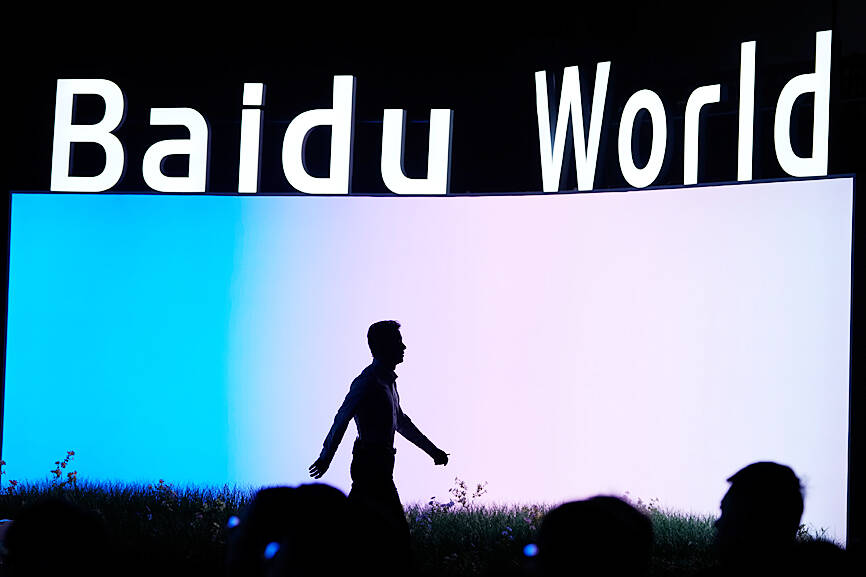Baidu Inc (百度) yesterday released the latest iteration of its flagship artificial intelligence (AI) models, trying to keep up in the highly competitive Chinese AI arena.
Its Ernie 5.0 model is a “natively omni-modal” model that can grasp user commands in various media formats, billionaire cofounder Robin Li (李彥宏) said during the company’s biggest annual tech showcase in Beijing.
“Intelligence itself is the greatest application, and the speed of technological iteration is the only moat,” Li said. “Baidu will continue to invest in and develop more cutting-edge models to push the ceiling of intelligence higher.”

Photo: AP
In benchmarks presented by Baidu on stage, Ernie 5.0 competed with rivals such as DeepSeek (深度求索), Alphabet Inc’s Google Gemini and OpenAI’s GPT-5 in tests for language, audio and visual understanding. While Baidu’s AI rarely had the highest score, the company sought to demonstrate it was keeping up with the leaders.
China’s Internet search pioneer is betting on AI to drive growth, but it faces mounting pressure from open-source models such as DeepSeek, as well as AI-native apps.
Plagued by weakening advertising, its revenue is expected to decline 8 percent — the biggest slide in almost a decade — during the September quarter.
Li touched on the ongoing debate around whether the industry is fomenting an AI bubble.
Without naming companies, he called out an “unhealthy, unsustainable” structure in which chipmakers reap the most benefits of AI, rather than app developers.
“No matter how much money chipmakers make, the models built on top of the chips should generate 10 times the value and the applications developed on top of the models should create 100 times the value — only then can we achieve a healthy industrial ecosystem,” Li said.
The announcement of the new model came at the end of a three-hour demonstration of Baidu’s other offerings.
It has developed two new chips for AI inference and training, which are to be available for sale next year and 2027, executives said, without revealing specs.
In AI software, the company launched an agentic tool for industrial uses such as traffic light control. It is also pushing some of its existing products to overseas markets, including a digital-avatar replacement for streamers and a code-free development tool.
Baidu had a head start in China’s AI race and looked at one point like the country’s most formidable rival to OpenAI, but it soon lost leadership to rivals including ByteDance Ltd (字節跳動) and Alibaba Group Holding Ltd (阿里巴巴). The two lead in AI-native applications and open-source models respectively, while Baidu is struggling to catch up on both fronts.
Li had previously predicted that proprietary models would stand out in competition — before the emergence of DeepSeek, which prompted his company to reverse course and open-source its Ernie models.
The founder also initially skipped AI video generation, although Baidu is now chasing rivals such as Kuaishou Technology (快手科技), after they proved the monetization potential of that aspect.

South Korea’s equity benchmark yesterday crossed a new milestone just a month after surpassing the once-unthinkable 5,000 mark as surging global memory demand powers the country’s biggest chipmakers. The KOSPI advanced as much as 2.6 percent to a record 6,123, with Samsung Electronics Co and SK Hynix Inc each gaining more than 2 percent. With the benchmark now up 45 percent this year, South Korea’s stock market capitalization has also moved past France’s, following last month’s overtaking of Germany’s. Long overlooked by foreign funds, despite being undervalued, South Korean stocks have now emerged as clear winners in the global market. The so-called “artificial intelligence

‘SEISMIC SHIFT’: The researcher forecast there would be about 1.1 billion mobile shipments this year, down from 1.26 billion the prior year and erasing years of gains The global smartphone market is expected to contract 12.9 percent this year due to the unprecedented memorychip shortage, marking “a crisis like no other,” researcher International Data Corp (IDC) said. The new forecast, a dramatic revision down from earlier estimates, gives the latest accounting of the ongoing memory crunch that is affecting every corner of the electronics industry. The demand for advanced memory to power artificial intelligence (AI) tasks has drained global supply until well into next year and jeopardizes the business model of many smartphone makers. IDC forecast about 1.1 billion mobile shipments this year, down from 1.26 billion the prior

Chinese artificial intelligence (AI) start-up DeepSeek’s (深度求索) latest AI model, set to be released as soon as next week, was trained on Nvidia Corp’s most advanced AI chip, the Blackwell, a senior official of US President Donald Trump’s administration said on Monday, in what could represent a violation of US export controls. The US believes DeepSeek will remove the technical indicators that might reveal its use of American AI chips, the official said, adding that the Blackwells are likely clustered at its data center in Inner Mongolia, an autonomous region of China. The person declined to say how the US government received

People stand in a Pokemon store in Tokyo on Thursday. One of the world highest-grossing franchises is celebrated its 30th anniversary yesterday.